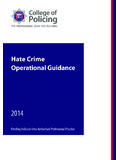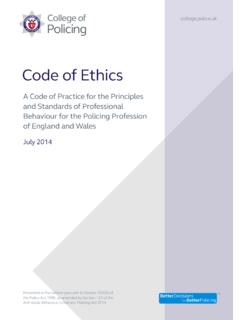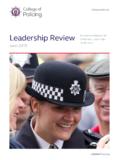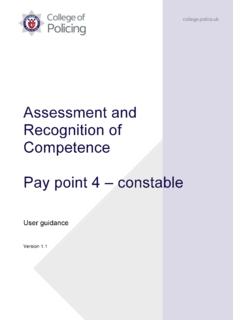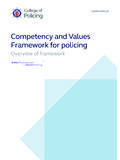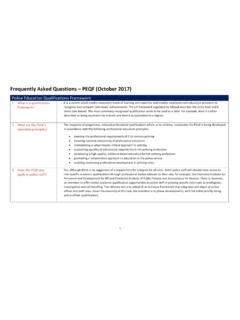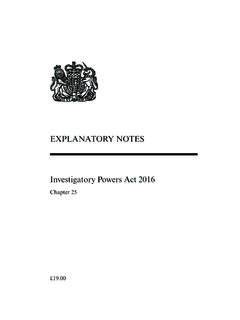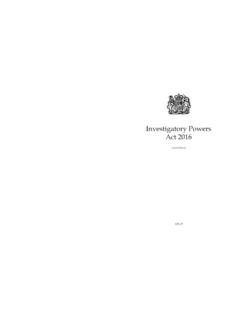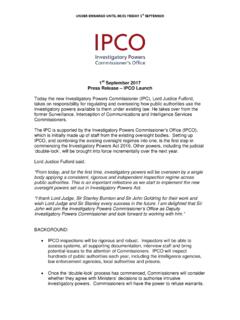Transcription of Undercover policing APP - consultation draft 29 …
1 Undercover policing Authorised Professional Practice For consultation : 29 June to 10 August 2016 . Please send feedback to: 2016 College of policing Limited, All Rights Reserved 1. consultation draft 29 June to 10 August 2016 . Undercover policing A number of covert tactics are available to law enforcement to prevent and detect crime or disorder and maintain public safety. Undercover is one of them. Applied correctly and supported by appropriate training, Undercover is a proportionate, lawful and ethical tactic which is effective in obtaining evidence and intelligence. Contents 1. Accreditation 3. 2. Undercover operatives .. 6. 3. Other roles ..16. 4. Welfare ..28. 5. Backstopping and legend building ..34. 6. Operational ..39. 7. Authorisation and conduct.
2 45. 8. Planning, risk and deployment ..57. 9. Witness anonymity ..67. 10. Records ..71. 11. Other deployments ..78. See also a statement from Chief Constable Jon Boutcher, National policing Lead for Undercover . 2016 College of policing Limited, All Rights Reserved 2. consultation draft 29 June to 10 August 2016 . 1. Accreditation The Undercover accreditation process is designed to help forces and agencies deliver Undercover operations safely, ethically and lawfully. Main points: all units that deliver Undercover operations should be accredited accreditation requires up-to-date self-assessments confirmed annually and validation visits at least every three years there is internal and external oversight and governance for Undercover .
3 Contents Accreditation process Oversight and governance 2016 College of policing Limited, All Rights Reserved 3. consultation draft 29 June to 10 August 2016 . Accreditation process All units that manage Undercover operations should undertake a self-assessment process for accreditation to deploy Undercover operatives. This process is based on a three-year cycle, as follows: All units complete a self-assessment Self-assessment describes the Undercover authorisation, governance and tactical management arrangements units have in place. The descriptions set out how units manage foundation and advanced Undercover activity. Units may be accredited based on their self-assessment The category of accreditation determines whether units can manage foundation and/or advanced deployments.
4 Accredited units update and certify their self- assessments Units should update their self-assessments when significant changes occur to their structure or operating practices and certify the accuracy of assessments annually. Accredited units are visited by College of policing validators at least every three years Validators will make recommendations to the College of policing accreditation registrar about whether the unit should continue to be accredited or whether the accreditation should be amended or withdrawn. The College of policing registrar reaccredits units based on the outcome of validation visits The content of annual self-assessments, or failure to submit annual updates, may trigger a validation visit or cause accreditation to be withdrawn.
5 If the accreditation registrar becomes aware of concerns about a unit's performance, they may arrange a validation visit or withdraw accreditation with immediate effect. 2016 College of policing Limited, All Rights Reserved 4. consultation draft 29 June to 10 August 2016 . Units can also receive practice advice and support from the National Undercover Working Group. Oversight and governance The following provide oversight and governance to Undercover : College of policing Office of Surveillance Commissioners Investigatory Powers Tribunal Crown Prosecution Service Her Majesty's Inspectorate of Constabulary. See also the authorising officer and senior responsible officer role descriptions in chapter 3. 2016 College of policing Limited, All Rights Reserved 5.
6 consultation draft 29 June to 10 August 2016 . 2. Undercover operatives Undercover operatives (UCOs) are members of a law enforcement agency who are selected, vetted, trained and accredited to gather intelligence and evidence. Main points: UCOs are law enforcement personnel trained to carry out deployments there are two categories of UCO. the foundation programme is the single point of entry for staff who want to become a UCO. deployment and development options include progression to the advanced programme a UCO's eligibility to deploy can change over time Undercover units operate a risk-based tenure policy. Contents Legislation Features of the role Categories of UCO. Selection, training and development Eligibility to deploy Tenure Foundation programme Advanced programme 2016 College of policing Limited, All Rights Reserved 6.
7 consultation draft 29 June to 10 August 2016 . Legislation UCOs are deployed under direction in an authorised investigation or operation as a covert human intelligence source (CHIS). Section 26(8) of the Regulation of Investigatory Powers Act 2000. (RIPA) defines a person as a CHIS if: (a) he establishes or maintains a personal or other relationship with a person for the covert purpose of facilitating the doing of anything falling within paragraph (b) or (c);. (b) he covertly uses such a relationship to obtain information or to provide access to any information to another person; or (c) he covertly discloses information obtained by the use of such a relationship, or as a consequence of the existence of such a relationship. Statutory Instrument 2013/2788 further clarifies a UCO as a relevant source within a number of defined law enforcement agencies.
8 Relevant sources operate at a higher level of scrutiny and management than members of the public recruited as CHIS. Features of the role The role of UCO is voluntary, but all UCOs need to: comply with the UCO code of conduct maintain an up-to-date profile on the national Undercover database create and maintain legends. All UCOs have successfully completed nationally-licensed training. They maintain accreditation through continuing professional development (CPD). The roles, responsibilities and conduct of individual UCOs should be commensurate with their skills, knowledge, ability, training and experience. 2016 College of policing Limited, All Rights Reserved 7. consultation draft 29 June to 10 August 2016 . Categories of UCO. There are two categories of UCO: Undercover foundation operatives (UCFs).
9 Undercover advanced operatives (UCAs). Undercover online operatives (UCOLs) are either UCFs or UCAs. Foundation operatives UCFs carry out low-level infiltration that does not require the ability to withstand intense scrutiny. After initial training, UCFs can attain additional modules which enable them to be deployed on a greater range of duties. For example, online or street drug buyer. UCFs undertake CPD to maintain their accreditation and so that they can be deployed in specialist subject areas. UCFs can be deployed with UCAs, but only in limited supporting roles. Advanced operatives UCAs are trained to undertake deployments involving higher-level infiltrations in a leading role with the ability to withstand intense scrutiny.
10 UCAs undertake CPD to maintain their accreditation and so that they can be deployed in specialist subject areas. Online operatives UCOLs are either foundation or advanced UCOs. They are operatives who are deployed to establish and maintain relationships with an individual, network or organisation through the use of the internet with the covert purpose of obtaining intelligence, information or evidence as part of an authorised operation. UCOLs include staff previously described as covert internet investigators who have been awarded grandparent rights' as a UCF to perform the role of UCOL. They are identified on a national index. See also the section on online operations. 2016 College of policing Limited, All Rights Reserved 8. consultation draft 29 June to 10 August 2016 .

